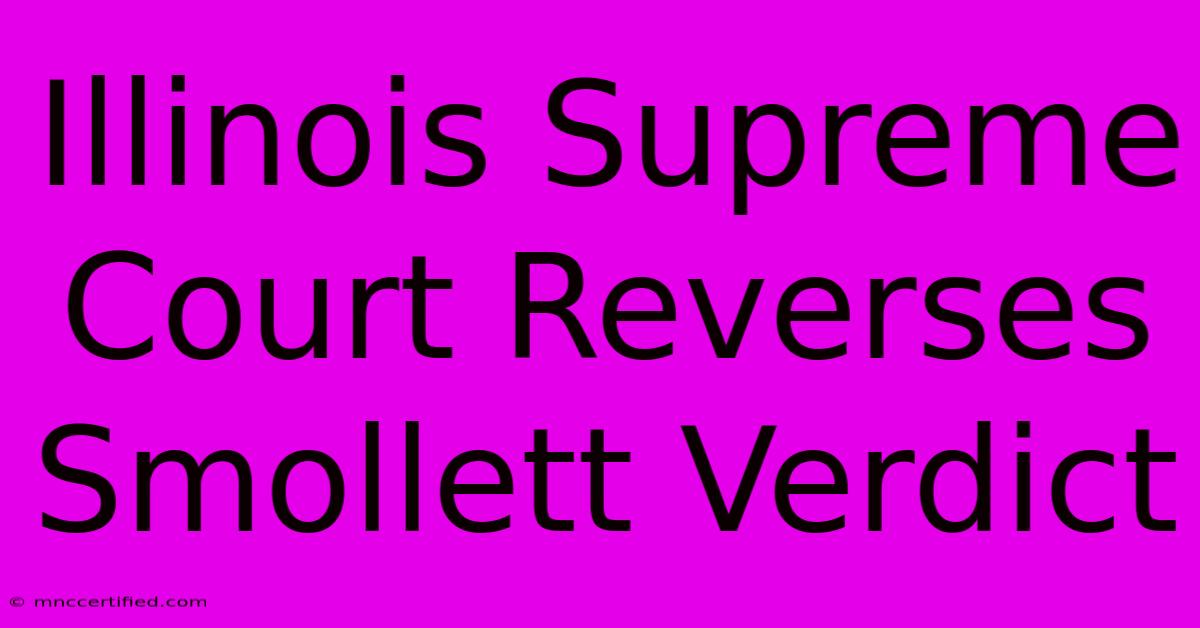Illinois Supreme Court Reverses Smollett Verdict

Table of Contents
Illinois Supreme Court Reverses Smollett Verdict: A Deep Dive into the Case
The Illinois Supreme Court's decision to overturn Jussie Smollett's conviction has sent shockwaves through the legal community and beyond. This landmark ruling raises significant questions about prosecutorial misconduct, the fairness of the trial, and the implications for future cases involving similar allegations. This article delves into the details of the case, examines the court's reasoning, and explores the broader implications of this controversial decision.
Understanding the Original Case
Jussie Smollett, a former actor known for his role in the television series Empire, was accused of staging a hate crime against himself in Chicago in 2019. He claimed he was attacked by two masked men who shouted racial and homophobic slurs before assaulting him. The subsequent investigation, however, revealed inconsistencies in Smollett's account, leading to his arrest and trial.
Key aspects of the original case included:
- The alleged attack: Smollett's claims of a brutal assault, fueled by intense media coverage, ignited a national conversation about hate crimes and racial injustice.
- The investigation: Chicago police conducted a thorough investigation, revealing evidence that contradicted Smollett's narrative. This included surveillance footage and testimony from individuals involved in the alleged hoax.
- The trial and conviction: Smollett was found guilty on five counts of disorderly conduct for filing a false police report. He received a sentence of 150 days in jail, 30 months of probation, and was ordered to pay restitution for police resources used in the investigation.
The Illinois Supreme Court's Decision
The Illinois Supreme Court, in a unanimous decision, reversed Smollett's conviction. The court focused on a procedural issue concerning the special prosecutor appointed to the case after the initial prosecutor was removed. The court ruled that the judge lacked the authority to appoint a special prosecutor under Illinois law. This critical procedural error, according to the court, invalidated the entire prosecution.
The Core Argument: Special Prosecutor Appointment
The Supreme Court's ruling hinges on the legality of appointing a special prosecutor. The court determined the original appointment process violated existing statutes outlining the proper procedures for such appointments. This, they argued, resulted in a fundamental flaw that compromised the integrity of the trial. The court emphasized the importance of adhering to established legal processes to ensure a fair trial and to uphold the rule of law.
Implications of the Ruling
The reversal of Smollett's conviction has profound implications:
- Prosecutorial oversight: The decision highlights the crucial need for strict adherence to legal procedures in all criminal prosecutions. It raises concerns about potential abuses of power and the importance of checks and balances within the justice system.
- Impact on future cases: The ruling could influence the handling of similar cases involving allegations of false reporting or fabricated hate crimes. Prosecutors will need to meticulously follow established procedures to avoid similar procedural errors.
- Public perception: The case continues to generate significant public debate regarding racial justice, media influence, and the complexities of the justice system. The reversal is likely to further fuel discussions about accountability and transparency in the legal process.
What Happens Next?
While Smollett's conviction has been overturned, the case isn't necessarily closed. The state could potentially decide to retry Smollett, this time following proper procedures for appointing a special prosecutor, if they choose to do so. However, given the procedural nature of the Supreme Court's ruling, a retrial remains uncertain.
Conclusion: A Case Study in Procedural Law
The Smollett case serves as a potent reminder of the importance of proper legal procedures in ensuring justice. The Illinois Supreme Court's decision, while controversial, underscores the critical role of due process and the potential consequences of procedural errors. The case's long-term impact on legal practices and public perception will undoubtedly continue to unfold in the coming months and years. The decision highlights the ongoing complexities of the legal system and the ongoing debate surrounding hate crime allegations.

Thank you for visiting our website wich cover about Illinois Supreme Court Reverses Smollett Verdict. We hope the information provided has been useful to you. Feel free to contact us if you have any questions or need further assistance. See you next time and dont miss to bookmark.
Featured Posts
-
Am Best Rating Farmers Insurance
Nov 22, 2024
-
Iceland Volcano Erupts Again Near Grindavik
Nov 22, 2024
-
Smollett Case Hate Crime Conviction Void
Nov 22, 2024
-
Rooneys Plymouth Life Boozy Nights And Takeaways
Nov 22, 2024
-
Arsenal Vs Juventus Live Womens Champions League
Nov 22, 2024